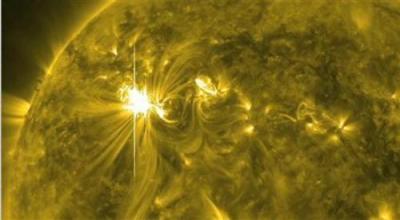Solar Flares Hitting Earth; Could Ground Flights, Disrupt Networks
Common Questions: When Will Solar Flares Hit? How Will They Impact Flights? Will Solar Flares Affect Health?
Earth's magnetic field is expected to be hit by the effects of a major solar flare on Thursday, which might disrupt utility grids, airline flights, satellite networks and GPS services across the Northern globe.

"It's hitting us right in the nose," explained Joe Kunches, a scientist for the National Oceanic and Atmospheric Administration in Boulder, Colo. The sun has not produced much turbulent activity in a while, but a recent solar flare, part of a normal 11-year-cycle that occurred earlier this week, has grown and reached outwards from the sun, The Associated Press reported.
When it hits Earth's magnetic field, it has the potential to disrupt some important network technology, but also string the aurora lights farther from the poles than normal. Scientists are saying that the storm will not put human health in danger, however.
"This is a good-size event, but not the extreme type," added Bill Murtagh, program coordinator for the federal government's Space Weather Prediction Center.
The technological problems that the storm might cause include making global positioning systems less accurate, causing trouble for satellites, and even forcing a number of airlines to reroute their flights. The effects could continue into Friday morning, but the brunt of the impact will be felt throughout Thursday.
Scientists fear that this might not be the only blast to come our way, however. If that same region of the sun sends out more solar storms, we might experience more problems in the near future.
"This is a big sun spot group, particularly nasty," NASA solar physicist David Hathaway revealed. "Things are really twisted up and mixed up. It keeps flaring."
The more noticeable aurora lights will be visible Thursday evening, Kunches said, and shared that they might even appear south of the Great Lakes states near the Canada-USA border. A full moon at the same time would make them harder to see, however.
It is projected that this will be the strongest overall solar storm to hit Earth since Dec. 2006.





























